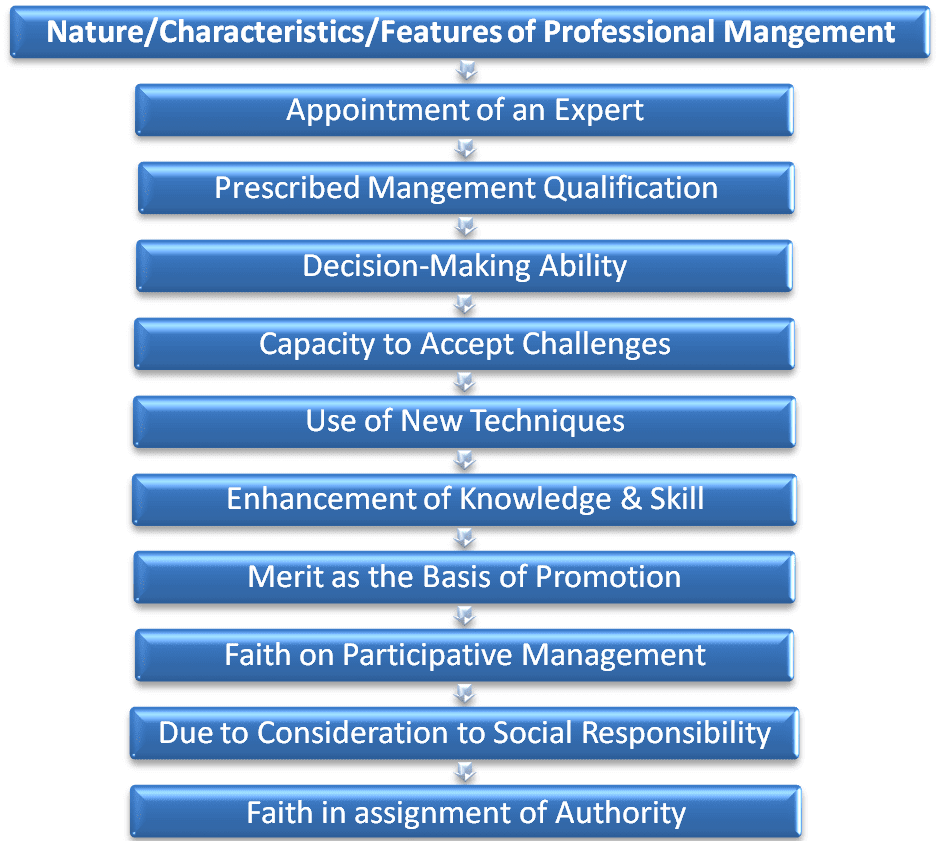 Meaning of Professional Management
Meaning of Professional Management
Professional Management refers to the seasoned approach in administering the organization. In such organizations the top management positions and even the lower management position are held by professional people. They have the professional qualifications, administrative & technical skills and also the good amount of experience in managing business affairs.
 Definition of Professional Management
Definition of Professional Management
According to Louis Allen Professional Management defined as follows:
"A Professional manager is one who specializes in the work of planning, organizing, leading and controlling the efforts of others and does so thought systematic use of classified knowledge, a common vocabulary and principles and who subscribes to the standard of practice and code of ethics establish by recognised body".
 Nature /Characteristics / Features of Professional Mangement
Nature /Characteristics / Features of Professional Mangement
The Nature, Characteristics, Features of Professional Mangement are as follows:
- Appointment of an Expert
- Prescribed Mangement Qualification
- Decision-Making Ability
- Capacity to Accept Challenges
- Use of New Techniques
- Enhancement of Knowledge & Skill
- Merit as the Basis of Promotion
- Faith on Participative Management
- Due to Consideration to Social Responsibility
- Faith in Assignment of Authority
Now let's discuss each Nature, Characteristics, Features of Professional Mangement one by one.
1. Appointment of an Expert
In professional management, there is always a specialized and expert person is appointed to look after the management of each area. The major areas in the business enterprises include purchasing production, marketing, finance, etc. In professional management for each of the fields a specialized person is appointed, and he is responsible for the efficiency of the department.
2. Prescribed Mangement Qualification
In professional management, expert who are appointed must have prescribed management qualification in the branch which he is taking care of. It is also expected that he must have necessary practical experience. In other words, professional manager must be theoretically and practically sound.
3. Decision-Making Ability
In professional management, the managers have the ability to think, analyze situations and take rational decisions regarding business activities. Their decisions are generally very sound keeping in the prospective growth of business in their mind.
4. Capacity to Accept Challenges
In professional management, managers have the capacity to accept new challenges due to their educational and training background.
5. Use of New Techniques
In Professional management, managers use new techniques such as computers, automation and information technology for solving managerial problems.
6. Enhancement of Knowledge & Skill
In professional management, managers keep their knowledge and skill up to date by attending management development programmes. They attend conferences, seminars and workshops and enhance their knowledge and skill by exchanging their ideas with other professionals.
7. Merit as the Basis of Promotion
In professional management, the traditional and conservative types of management promotions to the higher posts are given based on seniority. This does not give scope for youngsters having talents who are very useful for the growth of business. Professionally managed companies give promotion to higher posts assuming merit or performance in the work.
8. Faith on Participative Management
In professional management, managers have faith in participative management. They encourage the subordinates to participate in the process of decision making.
9. Due to Consideration to Social Responsibility
In professional management, managers consider business as a socio-economic institution. Manager gives due to consideration to the concept of social responsibility. They give importance to consumer satisfaction. They try to bring a balance between profit motive and social responsibility. They go for consumer-oriented products. They try to improve the quality through research and development and so on.
10. Faith in Assignment of Authority
In professional management, the senior managers give assignments to the assistant managers. Normal and monotonous works are given to the assistant. Important decisions are taken by the head of the management.

ReplyDeleteall explanations are given very clearly and lucidly and subjects are well clear and thanks to the author and continue your great work sir
good prescription for those who are interested in taking this field and for future planning
ReplyDeleteNyc
ReplyDeleteA nice and precise piece. I found it very useful in one of my assignment. Qudos!!!
ReplyDeleteBest
ReplyDeleteNice information and easy to understand thank you
ReplyDeletethanks for this the great work.
ReplyDeletenice information I clearly understand the meaning very useful on my
ReplyDeleteassignment
Thanks for your help
ReplyDelete